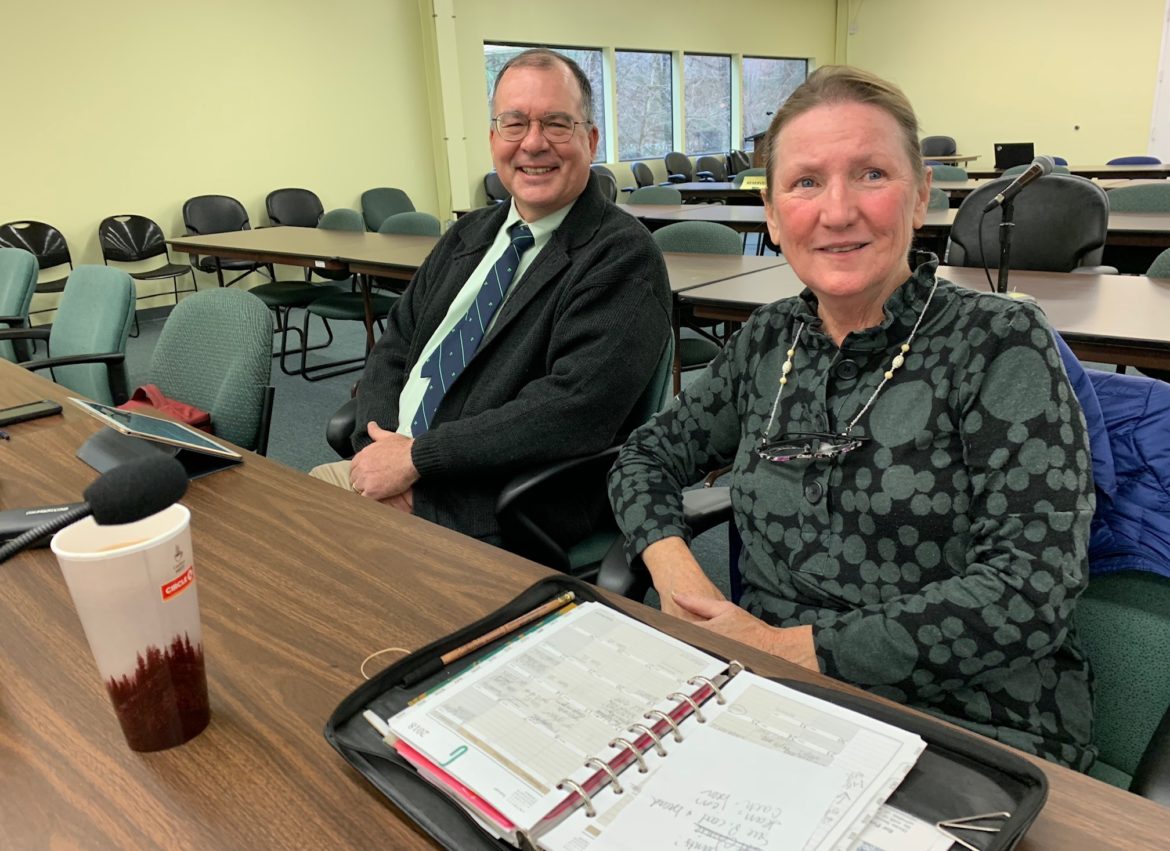By Nancy West, InDepthNH.org
CONCORD – Day three of deliberations on the proposed 13-mile high-voltage powerline from Madbury to Portsmouth likely dashed some intervenors’ hope that developer Eversource would use another method instead of jet plowing to bury the one-mile portion underneath Little Bay.
While considering the impact the Seacoast Reliability Project would have on water quality, members of the Site Evaluation Committee discussed the difficulties involved with the much more expensive option of burying the line using Horizontal Directional Drilling (HDD).
The HDD method would involve a drill boring underneath Little Bay and jet plowing would involve plowing a trough across the bottom.
Committee members reached a consensus that there were too many barriers to the HDD method to be considered.
Michael Fitzgerald, the Department of Environment Services’ designee on the committee, said the HDD burial method would add an extra $132 million over and above the cost of the $84 million project.
Fitzgerald said Eversource would have to acquire five properties in Durham and 10 properties in Newington to use the HDD method.
Eversource did a comparison of the two drilling methods, Fitzgerald said, and found risks of HDD significantly outweighed the benefits and estimated the construction time frame would be much longer at 28 months.
SEC Chairman Patricia Weathersby said people in the affected communities are frustrated and angry that the applicant would be stirring up nitrogen when their communities have been working so hard to clean up their own pollution.
“They have a right to be frustrated about that,” Weathersby said. But that’s not what she needs to look at, Weathersby said. Instead she needs to weigh the actual impact.
The impact, Weathersby said, is relatively small.
Christopher Way, the designee for the Division of Economic Development, said there are many unknowns in the HDD method.
“For my part, the jet plowing route makes sense for this case,” Way said.
Susan Duprey, a public member of the committee, said she was concerned by the public vehemence favoring HDD over jet plowing.
“It makes me think there’s some kind of campaign,” Duprey said. “I wonder if the public is fully educated.”
Duprey went on: “The experts for the Counsel for the Public were satisfied with jet plowing. That’s important to me.”
Durham reaction
Durham Town Manager Todd Selig, who represents the town and University of New Hampshire as an intervenor, said the committee was clear that HDD is not their preferred option and if the project is going to be approved, the committee would support jet plowing.
“Right now, the committee had the recommendations of Eversource’s experts,” Selig said. Durham and the University of New Hampshire wanted to make sure there was an unbiased opinion regarding the cost-benefit of jet plowing compared to HDD.
“We never got that,” Selig said.
The committee’s statements “diminishes some very reasonable concerns.
“We care passionately about the health of the bay and don’t want to see contaminants released and nitrogen buried in the soils there,” Selig said.
All of the sewered communities around Great Bay have worked hard to reduce the nitrogen that they discharge, he said.
“There have been significant reductions and the thought that over several days, they could discharge nitrogen equal to what Durham’s waste water plant does in a year is off-putting,” Selig said.
Little Bay is part of the Great Bay estuary, which is an impaired water body, Selig said, adding that millions of dollars of waste water upgrades have been made by Durham and Newington as required by the Department of Environmental Services.
Project need
Eversource says rapid growth in the Seacoast makes the project necessary. “The Independent System Operator of New England (ISO-NE) has determined that the Seacoast area needs additional transmission capacity to support the reliable delivery of electric power to meet the region’s current and future demand,” according to the project’s website.
The new line would cross through the towns of Madbury, Durham, Newington and Portsmouth along existing utility corridors.
“It will also ensure that the area’s electric grid conforms to national and regional reliability standards,” Eversource said.
More hearings
Last week, the Site Evaluation Committee agreed in two days of deliberations that the project meets some of the criteria laid out in the law to award a certificate to build to Eversource, but members made it clear they could change their minds as deliberations continue.
They agreed Eversource has the financial, managerial and technical ability to construct it. And on day two, the issue of the public’s trust in Eversource was raised by Weathersby with William Quinlan, president of Eversource NH, telling InDepthNH.org that the company is working hard to earn the trust of the people along the line.
“To the extent there are issues concerning trust, we work very hard to overcome those issues.
“Part of it is perhaps there’s the understandable question that we can’t answer until we execute the project and demonstrate through our actions that we are a responsible company, that we take concerns very seriously,” Quinlan said. “We’ll work very hard to address those issues.”
Longer than Northern Pass
Deliberations on the project have now officially gone on longer than the much larger Northern Pass project that was denied on day three of deliberations after 70 adjudicative hearings.
Northern Pass, a $1.6 billion project to bring Hydro-Quebec electricity from Pittsburg to Deerfield to southern New England, has appealed the SEC’s denial to the state Supreme Court.
Three more days have been scheduled for deliberating the Seacoast Reliability Project – Thursday, Friday and Monday at 49 Donovan St. in Concord. Deliberations involve members of the committee working in public to find consensus on the criteria laid out in the law.
The committee will continue deliberating the project’s impact on water quality. Deliberations are open to the public.





